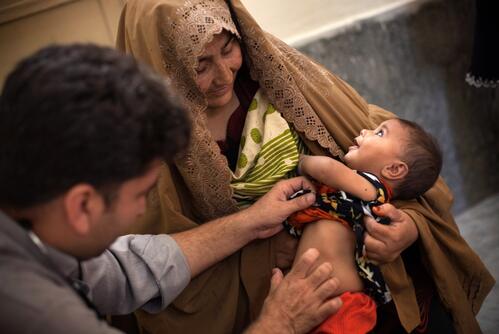In Pakistan, Médecins Sans Frontières (MSF) does not accept funding from any government or donor agency, and relies solely on private donations from the general public to carry out its work. MSF also runs medical programmes in Peshawar, Lower Dir, Malakand, Mansehra, Kurram Agency and Baluchistan province.
Between June 4 and 20, a total of 153 patients were admitted to the MSF ward in Mardan Medical Complex. On June 19, MSF began working in the center’s emergency room, where 41 patients were treated in the first three days of activity.
In the Takht Bhai Rural Health Centre, a total of 2,900 primary health care and emergency room consultations have taken place between June 2 to 20, in addition to 205 antenatal consultations and 13 baby deliveries. In Mardan district, MSF also operates an out-patient clinic in a displaced persons camp housing 5,800 people and provides shelter, relief items, and water and sanitation services for the displaced in the camp. Mobile clinics providing antenatal consultations are carried out in eight different schools that are housing displaced families.
In the women’s ward of Mardan Medical Complex, a displaced mother from Swat sits on a bed with her three month old baby. The boy weighs only 1.8 kg and is limp in her arms. The district hospital in Mardan referred the baby to the MSF-managed ward in the Mardan Medical Complex, a hospital just outside the city.
“This undernourished baby needs 24 hour surveillance and must be fed therapeutic milk every three hours,” said Dr. Salha Issoufu, the MSF emergency coordinator in Mardan. “It is very hard for the staff in the district hospital to provide that sort of care when the number of patients they receive has practically tripled since the arrival of so many more displaced people.”

The district hospital, in the centre of Mardan, is easily accessible to residents and the newly displaced, and was quickly overburdened by the sheer number of patients after fighting began in the Swat Valley and Buner. While Pakistani health authorities quickly reinforced their teams, sending medical personnel from around the country to Mardan, the hospital is nonetheless beyond capacity. To relieve the patient load, MSF opened a 20-bed ward in Mardan Medical Complex on June 4, which soon doubled in size. On June 19, MSF began working in the hospital’s emergency room.
“We haven’t seen alarming signs of an overall medical emergency other than the need to increase the capacity of local health structures,” said Dr. Issufou. “Some of the most common medical problems we have seen so far are related to dehydration due to diarrhoea and extreme heat here. The displaced families come from a much cooler climate in the mountains. Children and old people are particularly vulnerable to the heat. In terms of epidemics, cholera is endemic in the region so an epidemiological surveillance has been set up by authorities, and MSF is ready to provide support if necessary.”
Expanding services to meet growing needs
The Takht Bhai Rural Health Centre is about a 30 minute drive from the Mardan Medical Complex. In coordination with local health authorities, MSF began working there on June 2 and is carrying out medical consultations for displaced people, including antenatal consultations. It has also set up a delivery room in the center.
“When we first came to Takht Bhai Health Centre, the situation looked chaotic because the staff was totally overloaded,” said Jean Pierre Amigo, emergency coordinator for MSF in Mardan. “MSF was already carrying out consultations in a neighbouring camp for displaced people, but we also needed to support health facilities outside the camp. There was a particular need to provide a 24-hour delivery room, so we renovated the existing delivery room in Takht Bhai and ensured 24-hour medical care to assist deliveries.”
Together with the local health authorities, MSF has started an outreach campaign to make sure that women are aware of the free, round-the-clock service.
“There is really no reason for women to deliver in dangerous conditions when they have a freshly rehabilitated centre with medical staff on call 24 hours a day to help them,” said Jean Pierre. “Each week, the number of deliveries and consultations doubles, including antenatal consultations. We’re now rehabilitating more rooms in the health centre to expand the capacity.”
Back in the Mardan Medical Complex, a boy with acute diarrhoea arrives from the district hospital and is quickly isolated.
“They have no room to isolate cases in the district hospital, so the boy was sent to us here,” said Dr. Issufou. “The district hospital is so crowded that there are two or three patients to a bed in the paediatric ward. And in some beds you might find a boy like this one with acute diarrhoea sharing a bed with a child suffering from a respiratory infection. Overcrowding increases the risk of infections spreading between patients.”
Meanwhile, the small malnourished baby admitted the day before appears more alert and is starting to look around – a good sign.
“I’ve spent the past months taking him to different hospitals,” said his mother, “but I couldn’t keep going to Peshawar because it was too expensive. So I brought him back home to Swat. We fled from the fighting, and came to our family who lives here. I have seven daughters, and this is my only son. I just want him to get better.”
Dr. Issufou is optimistic.
“In the past 24 hours the baby’s situation has improved. He’s eating well and is much more awake than when he arrived. In two more weeks he should be well enough to leave the hospital.”


